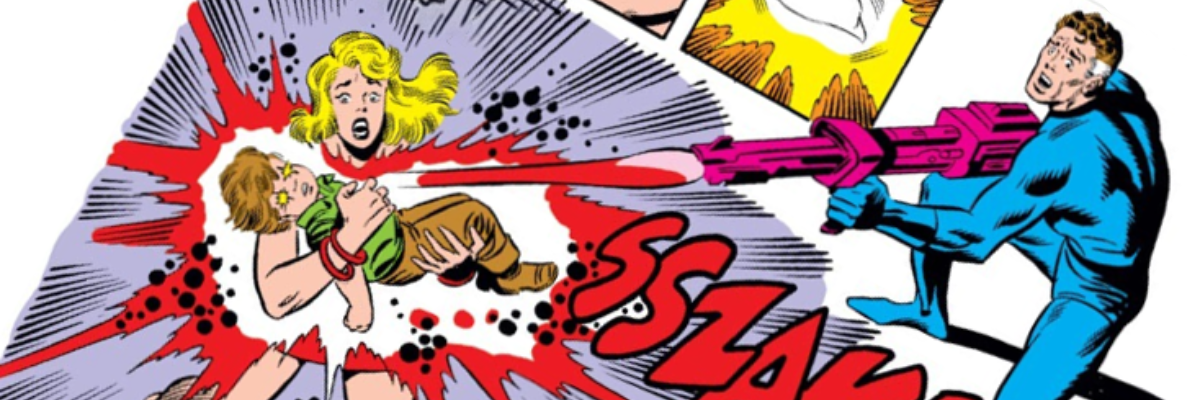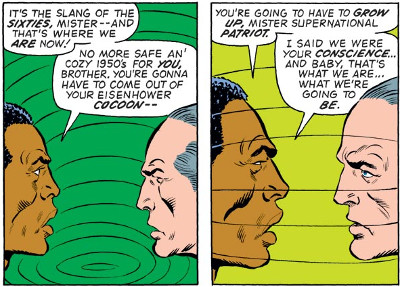Interview with Gerry Conway
Originally published July 2009

"I was working on instinct, and I guess my instincts for the FF weren't as on the mark as they might have been for Spider-Man. I'm pretty sure I wouldn't write the book the same way today."
Gerry Conway was the youngest writer of the Fantastic Four, and saw a period of great social change during his time on the book. As the writer of issues #133-152, plus #179 and Giant Size Fantastic Four #1-3, he discussed his work on the title with Headquarters...
Gerry, I think the thing that always strikes me most about your career in comics is just how successful you were at such a young age. Stories like the death of Gwen Stacy in Spider-Man were classics, yet you were only 20 when you wrote that, and just 21 when you created the Punisher. In addition to this, you were only just out of your teens when you started writing The Fantastic Four and were Editor-In-Chief of Marvel before your mid-20s. Did you ever feel pressure at getting so far in the industry when you were so young?
Precocity is a well-known curse; most of the pressure I felt as a younger writer was self-imposed. I wanted to be accepted by other writers and artists as an equal, which put me in some awkward situations -- pretending to be more mature than I was, emotionally, and professionally. As it happened, I was pretty good at faking a maturity I didn't have, which had advantages and, obviously, some disadvantages. I think people often forgot how young I was, and expected me to perform at a level that was actually beyond me. The result was, I was pretty stressed for most of my early career as a writer, and I often felt like I had no idea what I was doing -- which was true. I wrote instinctively and from the gut; when those instincts were appropriate to the material I was writing -- for example, when I was writing Spider-Man -- the results were something I was quite proud of, then and now. When my instincts were off, I didn't have the experience to either recognize it, or to compensate for it, with results that were more uneven. Probably more information than you requested, but there you go.
I understand that you initially crossed over from DC to Marvel due to Roy Thomas. We're used to different writers on the title today, but back then it was still something new, as Stan had only just left the title a few months before. How did it feel for you and Roy following on from the creator of the book, and did you get much feedback from Stan on what you were doing?
Well, it was quite intimidating, at least for me, but I had a fairly big ego at the time, and was just so excited for the opportunity to work on characters I loved, I don't think I gave it much thought. Stan really didn't give me any feedback directly; if he spoke to Roy about the direction of the series, I never heard about it.
All of the issues you scripted had a credit for Roy as Editor. Were these written Marvel plot, and how much of an influence was Roy at this time?
Almost everything I did at Marvel was written "Marvel-style," in collaboration with the artist. I wrote a handful of scripts in advance, one or two for the FF. (I don't recall which, off hand, though I think one of them featured Annihilus.) Roy provided general oversight, and rarely became involved with the plotting of an individual story, unless I asked him for input. He reserved his editorial oversight for the final product, and would sometimes rewrite a few lines of dialogue on the finished art.
You mentioned before the interview that you didn't think your run on the book was as strong as you would have liked. Although I always enjoyed the run, it's notable that you never actually got to write for the core team, with Sue replaced by Medusa throughout. Was this one of the elements you'd have done differently if you had the chance again?
I think so; I always preferred the original FF -- but the Medusa storyline was one that Roy put into place, and as it happened, that's what I worked with.
Although Stan was a very Liberal writer himself, one thing you and Roy really brought to the title was a humanist perspective. In particular, there's a two-part story plotted by Roy and scripted by yourself where America is taken back in time to the 1950s and you explore the prejudice of the era. Although many of the historical references were lost on me as a kid, the peaceful messages it put forward were not. Did you see that as a responsibility of yours, to, in a sense, 'educate' the child audience?
 Well, the late 60s and early 70s were a very progressive time in comics, and reflected the (overwhelmingly) liberal perspective of the writers and editors working at the time. (Many creators, of course, were more conservative than others, but even the most conservative creators of that time would probably be considered moderates, at worst, by today's standards.) We were just reflecting the popular attitudes of the time.
Well, the late 60s and early 70s were a very progressive time in comics, and reflected the (overwhelmingly) liberal perspective of the writers and editors working at the time. (Many creators, of course, were more conservative than others, but even the most conservative creators of that time would probably be considered moderates, at worst, by today's standards.) We were just reflecting the popular attitudes of the time.
Perhaps what most marks out your run on the title is one of conflict within the team - Sue files for divorce, Ben hits Johnny with intent and Reed puts his own son into a coma. It's certainly an interesting 'shake up' of the format, though isn't perhaps as 'warm' as the book had been before. Was this something you'd specifically intended?
Like I said above, I was working on instinct, and I guess my instincts for the FF weren't as on the mark as they might have been for Spider-Man. I'm pretty sure I wouldn't write the book the same way today.
Probably the most controversial element of your run came with your last two issues, which introduced 'Mahkizmo' in a satire of gender politics. Perhaps the most notable element of this was The Thing describing Thundra as a “nutty refugee from a women's lib meetin'”. Although very humorous to look back on, is this, in hindsight, a story you'd perhaps have had second thoughts about today?
You betcha. See above.
The last issue of Fantastic Four you worked on (#179) was a strange one - it's an issue written by Roy, but with a Gerry Conway plot/script credit for just the first three pages. Can you remember how that came about?
I think it was a result of my sudden departure from Marvel.
Your work on the comic pushed it in a slightly more adult direction, with the threat of divorce hanging over the team throughout your run. However, many comics today seem to be aimed at an exclusively adult market, with sex, bad language and so on. It's as if the creators are aiming them at guys like me who never grew out of them, and have forgotten altogether about the child audience. How do you feel about the way the comics industry has gone since you first began?
You're right on the mark -- comics today are aimed at a much older audience than the one we tried to reach in the 1970s, and that's a result of the way comics are marketed today. There's no way for comics to reach new readers (ie: younger readers) since they're not distributed, for the most part, in markets where new readers can be found. Comics are distributed primarily in speciality stores -- comic book shops, which have a self-selecting, older audience. It's been a long process and it's probably irreversible.
Finally, this year you returned to writing comics after 15 years away. If you had the chance to return to The Fantastic Four, would you take it?
You betcha.